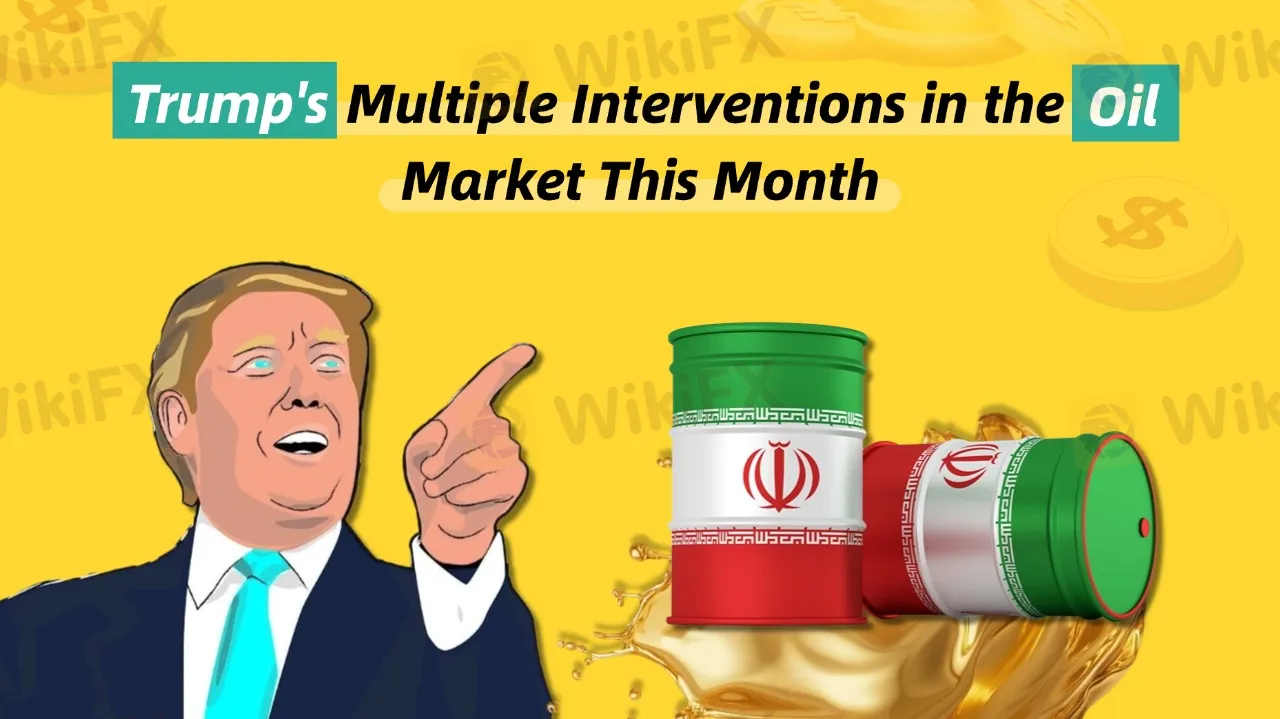简体中文
繁體中文
English
Pусский
日本語
ภาษาไทย
Tiếng Việt
Bahasa Indonesia
Español
हिन्दी
Filippiiniläinen
Français
Deutsch
Português
Türkçe
한국어
العربية
Trump's Multiple Interventions in the Oil Market This Month
Abstract:On February 4, U.S. President Donald Trump signed an executive order aimed at restoring the "maximum pressure" policy on Iran, intending to prevent Iran from selling oil to other countries and further weakening its economic foundation.

Trump clearly stated that he is willing to meet with Iranian leaders and attempt to persuade Iran to abandon its nuclear weapons development efforts. The order not only calls for increased pressure on violations of existing sanctions by the U.S. Treasury Department, but also plans to reduce Iran's oil exports to zero, intensifying economic pressure.
After Trump signed the order, the oil market was immediately affected. U.S. WTI crude oil briefly dropped by 3%, marking the first time it fell below the 2024 year-end level. However, the price quickly rebounded, with WTI's decline significantly narrowing and Brent crude also recovering, rising by about $2 in the short term. This fluctuation in oil prices reflects market uncertainty regarding Trump's policy, particularly in the context of global supply chain and oil market tensions, where any major policy change can quickly trigger a market response.
Will Trump's plan succeed?
Despite Trump's order clearly demanding the reduction of Iran's oil exports to zero, it remains uncertain whether this goal can be successfully implemented. In recent years, due to lax enforcement of sanctions and the evasion of restrictions, Iran's oil exports have gradually increased, especially after the U.S. withdrew from the Iran nuclear deal in 2018, which caused a significant rebound in Iranian oil exports. The Trump administration may need to implement stricter measures to effectively cut off Iran's oil revenue. However, given Iran's political and economic complexity, completely halting its oil exports remains a significant challenge.
Trump's intervention not only affects oil prices but also sparks a multi-party power struggle. OPEC+ this week maintained its existing oil production plans, without responding to Trump's calls. Analysts believe that OPEC+ may be waiting to see whether Trump will impose further economic sanctions or take more aggressive measures against Iran, Venezuela, and even Russia. Meanwhile, Trump's pressure may be part of his broader negotiation strategy, aiming to secure a “better deal” with Iran in the future.
Overall, Trump's multiple interventions this month have not only disrupted the oil market but also intensified international oil price volatility. Against the backdrop of a complex and ever-changing global economy, the ongoing power struggle among various parties will continue to influence the direction of the oil market. Investors must closely monitor Trump's policy developments to better assess oil price trends and their potential impact on the global economy.

Disclaimer:
The views in this article only represent the author's personal views, and do not constitute investment advice on this platform. This platform does not guarantee the accuracy, completeness and timeliness of the information in the article, and will not be liable for any loss caused by the use of or reliance on the information in the article.
Read more

Never Heard of Dynasty Trade? Here's Why You Should Be Worried
Have you heard this name before? No , it’s time you do because staying unaware could cost you. This platform is currently active in the forex trading and has been linked to several suspicious activities. Even if you’ve never dealt with it directly, there’s a chance it could reach out to you through ads, calls, messages, or social media. That’s why it’s important to know the red flags in advance.

WEEKLY SCAM BROKERS LIST IS OUT! Check it now
If you missed this week's fraud brokers list and are finding it difficult to track them one by one — don’t worry! We’ve brought together all the scam brokers you need to avoid, all in one place. Check this list now to stay alert and protect yourself from fraudulent brokers.

Catch the Latest Update on BotBro & Lavish Chaudhary
BotBro, an AI-based trading platform, became popular in India in 2024—but for negative reasons. Its founder, Lavish Chaudhary, who gained a huge following by promoting it heavily on social media. Since then, he has become well-known, but for many controversies. Let’s know the latest update about Botbro & Lavish Chaudhary.

Trading Other People’s Money | What Prop Firms Don’t Tell You
Proprietary (prop) trading firms have become increasingly popular. They give traders the chance to trade with larger amounts of money without risking their own savings. For many, this sounds like the perfect opportunity to grow faster and earn more. But while the benefits are appealing, there are also risks and hidden rules that traders must understand before joining a prop firm.
WikiFX Broker
Latest News
Is Your Forex Strategy Failing? Here’s When to Change
FSMA Warns That Some Firms Operate as Pyramid Schemes
Apex Trader Funding is an Unregulated Firm | You Must Know the Risks
Sigma-One Capital Scam? Investors Say They Can’t Withdraw Funds
Federal Reserve likely to hold interest rates steady despite pressure from Trump. Here's what that means for your money
WEEKLY SCAM BROKERS LIST IS OUT! Check it now
Intel drops 9% as chipmaker's foundry business axes projects, struggles to find customers
Palantir joins list of 20 most valuable U.S. companies, with stock more than doubling in 2025
Textiles to whisky: U.K.–India 'historic' deal is set to boost bilateral trade by over $34 billion a year
Thailand-Cambodia border clashes: Cambodia's economy has more to lose, analysts say
Currency Calculator


